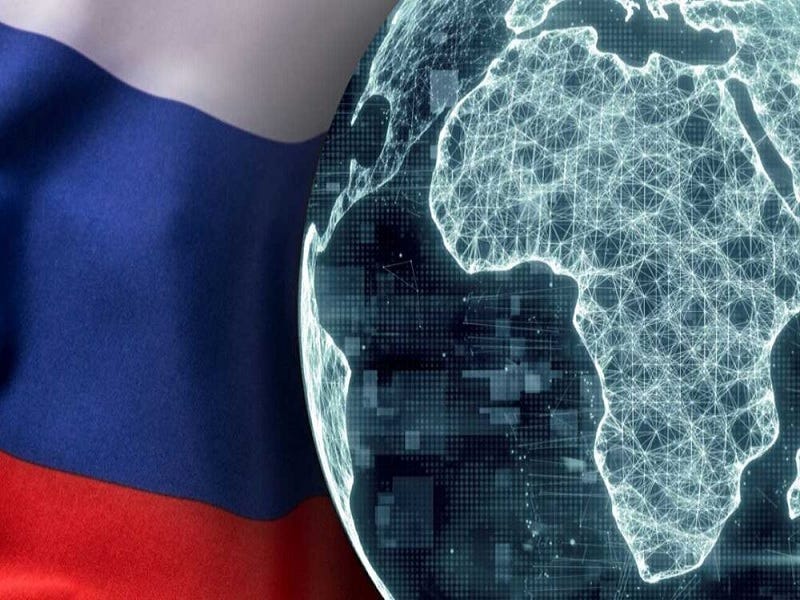What Russian and affiliated media provide is another way to interpret events across the world, and unlike the West, that country doesn’t have a toxic legacy on the continent nor has it ever exploited African states like its Western rivals have and still continue to do. The worldview that’s articulated by these outlets is multipolar and fully in line with the objective interests of African societies, unlike the West’s unipolar one that objectively contradicts those aforesaid interests.
The New York Times condescendingly implied that Africans lack the media literacy to discern the difference between fact and fiction in their latest piece about why they’re embracing Russian media. Titled “How Putin Became a Hero on African TV”, it pushes the conspiracy theory that there’s supposedly a shadowy Kremlin-concentric plot at play to explain this growing trend, which denies Africans any agency with respect to deciding for themselves which information products to consume.
It's not difficult to figure out what’s going on as long as observers aren’t blinded by wishful thinking fantasies like those that continue to influence many Western commentators. It’s common sense that Africans would gravitate towards alternative sources of information to learn more about events across the world after rightly coming to suspect the US-led West’s Mainstream Media (MSM) of ulterior motives.
They saw first-hand just how untruthful the MSM’s narratives can be after those outlets pushed counterfactual narratives about their countries over the decades in order to manipulate global perceptions about whatever it was that their societies were experiencing at the time. Furthermore, the neo-colonial nature of their countries’ post-independence relations with their former colonizers – especially those that used to be ruled by France – obviously doesn’t appeal to average Africans.
What Russian and affiliated media provide is another way to interpret events across the world, and unlike the West, that country doesn’t have a toxic legacy on the continent nor has it ever exploited African states like its Western rivals have and still continue to do. The worldview that’s articulated by these outlets is multipolar and fully in line with the objective interests of African societies, unlike the West’s unipolar one that objectively contradicts those aforesaid interests.
Intrepid readers can learn more about these notions and trends by reviewing the following analyses:
* “What’s Dishonestly Smeared As ‘Russian Propaganda’ Is Just The Multipolar Worldview”
* “Macron Insulted Africans’ Intelligence By Claiming That Multipolar Powers Manipulate Them”
* “Analyzing President Putin’s Vision Of Russian-African Relations”
* “Russia’s Newfound Appeal To African Countries Is Actually Quite Easy To Explain”
* “Politico’s Piece On The Russo-Franco Competition In Africa Ignores Local Countries’ Agency”
* “Dmitry Medvedev Is Right: The Global South Is Rising Up Against Neo-Colonialism”
* “There’s No Sino-Russo ‘Propaganda Collusion’ But Simply A Convergence Of Worldviews”
* “A Congolese Opposition Figure Told The West What It Must Do To Remain Competitive In Africa”
As can be seen, everything boils down to common sense, not any sort of conspiracy theory.
The West continues disrespecting Africans’ intelligence by producing information products implying that tens of millions of them aren’t smart enough to avoid falling for so-called “Russian propaganda”. This de facto New Cold War bloc can’t acknowledge the grassroots appeal of Russia or its worldview since doing so would by default contradict their claims of “exceptionalism” and “supremacy”, thus neutralizing the twisted so-called “moral basis” upon which they “justify” their hegemonic policies on the domestic front.
A fundamental revolution of their worldview is required for the West to stand any chance of competing with Russia for hearts and minds in Africa, which is precisely what the Congolese opposition figure referenced in the last-mentioned analysis suggested. The failure to do so will doom them into feeling forced to resort to aggressive and subversive measures out of desperation to cling to their fading influence, thus destabilizing Africa and running the risk of far-reaching blowback to their own interests.
For as obvious of a solution as this may seem, it remains unrealistic so long as the West’s ruling elite continues formulating policy according to liberal-globalist precepts, which are supremacist by dint of seeking to force all other states into following models incompatible with their historical traditions. Therein lies the persistent problem since there’s no credible reason to expect them to reconsider their worldview seeing as how much they truly believe in their own “exceptionalism” and “supremacy”.
Furthermore, these bigoted notions serve the purpose of instilling their targeted domestic audience with the false belief that they’re on a so-called “civilizing mission” and must therefore “sacrifice for the greater good”, thereby enabling the elite to fleece them indefinitely on that pretext. This being the case, Western policymakers are thus expected to continue clinging to this geostrategically counterproductive worldview, which will accelerate the decline of their de facto New Cold War bloc’s influence in Africa.




